Filter 1416 resources:
- disinformation (252)
- news (230)
- media (229)
- content strategy (194)
- social media (165)
- journalism (152)
- facebook (137)
- curation (136)
- storytelling (103)
- blogging (83)
- psychology (79)
- video (78)
- content (76)
- audiovisual (64)
- ai (62)
- community (61)
- native advertising (57)
- factchecking (55)
- us2020 (54)
- filter bubble (50)
- blog (49)
- semantic (49)
- algorithm (49)
- longform (48)
- tool (48)
- content marketing (48)
- cognitive (46)
- medium (39)
- bloggingportal (39)
- data journalism (39)
- promotion (38)
- eu (38)
- trump (37)
- audience research (36)
- productivity (35)
- design (35)
- twitter (33)
- science (32)
- multilingualism (32)
- podcast (31)
- politics (31)
- trust (31)
- myhub (29)
- visualisation (28)
- publicsphere (28)
- data (27)
- augmented reality (26)
- authenticity (26)
- innovation (25)
- visual (25)
- seo (24)
- newsletter (24)
- online architecture (24)
- covid19 (24)
- conspiracy (22)
- backfire effect (21)
- linkedin (21)
- communications (20)
- strategy (20)
- atprotocol (19)
- science journalism (18)
- data visualisation (18)
- explainer (17)
- mobile (17)
- enewsletter (17)
- google (17)
- science communication (17)
- realtime (17)
- democracy (16)
- knowledge management (16)
- censorship (16)
- polarization (16)
- comments (16)
- identity (16)
- infographic (16)
- advertising (16)
- virtual reality (16)
- bot (16)
- us (16)
- delegitimise (15)
- ux (15)
- information (14)
- metrics (14)
- interactive (14)
- crowdsourcing (14)
- stream (13)
- clickbait (13)
- engagement (13)
- gtd (13)
- messaging (13)
- nytimes (12)
- digital transformation (12)
- post-truth (12)
- propaganda (12)
- fediverse (12)
- web design (12)
- tv (12)
- llm (12)
- personal (12)
- bloggingportal2 (12)
- confirmation bias (11)
- instagram (11)
- troll (11)
- persuasion (10)
- k4p (10)
- 2ndbrain (10)
- gds (10)
- animation (10)
- machine learning (10)
- viral (10)
- atomisation (9)
- image (9)
- cms (9)
- nlp (9)
- creativity (9)
- brexit (9)
- business model (9)
- media literacy (9)
- ec (9)
- domestic (9)
- newsroom (9)
- faq (9)
- russia (9)
- bluesky (8)
- (8)
- ocm (8)
- 360video (8)
- platform (8)
- instant articles (8)
- evidence-based policy (8)
- information architecture (8)
- livestream (8)
- narratives (8)
- qanon (8)
- cards (8)
- ea (8)
- marketing (8)
- yanss (8)
- open web (7)
- participation (7)
- top3pods (7)
- search (7)
- startup (7)
- blogpocalypse (7)
- web (7)
- privacy (7)
- event (7)
- bbc (7)
- outreach (7)
- vote (7)
- organisation (7)
- internal communications (7)
- machine translation (7)
- buzzfeed (7)
- cambridge analytica (7)
- circa (7)
- collective intelligence (7)
- regulation (7)
- app (7)
- editorial (7)
- pr (7)
- groupthink (7)
- html5 (7)
- web20 (6)
- bestof2015 (6)
- vox (6)
- persona (6)
- theme (6)
- antivaxxer (6)
- signaltonoise (6)
- wikipedia (6)
- analytics (6)
- blogger (6)
- sceptic (6)
- truth (6)
- bias (6)
- chatgpt (6)
- chat (6)
- tribe (6)
- policy (6)
- climate (6)
- deep fake (6)
- euractiv (6)
- suppress (6)
- b2b4me (6)
- slack (6)
- uk (5)
- memory (5)
- obsidian (5)
- framework (5)
- activitypub (5)
- blockchain (5)
- brand (5)
- hate (5)
- zettelkasten (5)
- hoax (5)
- vine (5)
- substack (5)
- gender (5)
- usa (5)
- headline (5)
- decentralised (5)
- open source (5)
- facebook live (5)
- basic (5)
- screencast (5)
- sponsored content (5)
- atprotocol lexicon (5)
- google+ (5)
- europa (5)
- technology (5)
- quartz (5)
- snapchat (4)
- moments (4)
- solutions journalism (4)
- corporate journalism (4)
- optimisation (4)
- management (4)
- fbpaper (4)
- guardian (4)
- europe (4)
- portal (4)
- api (4)
- guide (4)
- politicoeu (4)
- leaflet (4)
- brussels bubble (4)
- moderation (4)
- education (4)
- magazine (4)
- publishing (4)
- knowledge visualisation (4)
- presentation (4)
- credibility (4)
- youtube (4)
- blm (4)
- free speech (4)
- help (4)
- inoculation (4)
- humour (4)
- bullshit (4)
- gpt-x (4)
- influence (4)
- apple (4)
- context (4)
- collaboration (4)
- futurism (4)
- sublime (4)
- echo chamber (4)
- dissonance (4)
- tools (4)
- responsive (4)
- ethics (4)
- machine text (4)
- disruption (3)
- agile (3)
- bundle (3)
- research (3)
- explanatory (3)
- change (3)
- outrage (3)
- intranet (3)
- tourism (3)
- lobby (3)
- logo (3)
- paper (3)
- ai4communities (3)
- gif (3)
- roamresearch (3)
- themes (3)
- hr (3)
- personalisation (3)
- meaning (3)
- example (3)
- writing (3)
- annotate (3)
- misinform (3)
- debunk (3)
- wiki (3)
- populism (3)
- ui (3)
- jeff jarvis (3)
- automation (3)
- memex (3)
- live (3)
- signal2noise (3)
- gamification (3)
- blogactiv (3)
- social marketing (3)
- mvp (3)
- infowar (3)
- andy matuschak (3)
- ai prompt (3)
- rebelmouse (3)
- powerpoint (3)
- transparency (3)
- faceted search (3)
- history (3)
- expert (3)
- eurosceptics (3)
- multimedia (3)
- transmedia (3)
- campaign (3)
- coda (3)
- euractiv-com (3)
- semanticweb (3)
- survey (3)
- standard.site (2)
- usability (2)
- project management (2)
- report (2)
- society (2)
- reality (2)
- fear (2)
- ngo (2)
- attentionweb (2)
- infopocalypse (2)
- china (2)
- computational propaganda (2)
- meme (2)
- risk (2)
- interface (2)
- culture (2)
- spambot (2)
- crowdfunding (2)
- mobocracy (2)
- desirability (2)
- pay4content (2)
- motivated (2)
- reflectivity (2)
- dunning-kruger (2)
- lean canvas (2)
- tumblr (2)
- comics (2)
- local (2)
- mastodon (2)
- wisdom (2)
- scicomm (2)
- crm (2)
- conference (2)
- law (2)
- hoaxy (2)
- share (2)
- library (2)
- trending (2)
- slideshow (2)
- authoritarianism (2)
- fomo (2)
- amp (2)
- copyright (2)
- notification (2)
- atlantic (2)
- counter speech (2)
- mooc (2)
- radio (2)
- slideshare (2)
- future (2)
- homepage (2)
- plagiarism (2)
- atavist (2)
- tag (2)
- pitch (2)
- keyword (2)
- buffer (2)
- training (2)
- nuzzle (2)
- river4 (2)
- seenthis (2)
- open science (2)
- australia (2)
- aggrefilter (2)
- iot (2)
- audio (2)
- meerkat (2)
- eparltv (2)
- goals (2)
- photography (2)
- scraping (2)
- planning (2)
- fivethirtyeight (2)
- mediafr (2)
- surveillance (2)
- drupal (2)
- taxonomy (2)
- usp (2)
- postmodern (2)
- skills (2)
- colour (2)
- backlink (2)
- social (2)
- mybot (2)
- curatorbot (2)
- osmo (2)
- learn (2)
- prezi (2)
- opencalais (2)
- ltinnovate2016 (2)
- bookmark (2)
- post-alpha (2)
- alpha phase (2)
- hosted (2)
- data4policy (2)
- balance (2)
- pluralistic ignorance (2)
- understanding (2)
- pink slime (2)
- flicc (2)
- product/market fit (2)
- sensemaking (2)
- euroblog (2)
- learning (2)
- syndicated-translation (2)
- excalidraw (2)
- massive.wiki (2)
- digital garden (2)
- mermaid (2)
- sari azout (2)
- whitewind (2)
- ios (1)
- playbook (1)
- trade (1)
- routine (1)
- slidecast (1)
- version control (1)
- user (1)
- egov (1)
- digg (1)
- gmo (1)
- freedom (1)
- economics (1)
- networking (1)
- bingchat (1)
- bioethics (1)
- citizen journalism (1)
- city (1)
- genetic (1)
- nasa (1)
- impact (1)
- freelancer (1)
- election (1)
- ep (1)
- compositional (1)
- game theory (1)
- lofi (1)
- vr (1)
- gov2.0 (1)
- conversation (1)
- bard (1)
- ai-image (1)
- adobe (1)
- glass (1)
- ai-agent-gpt (1)
- apathy (1)
- storyboard (1)
- roi (1)
- spectacles (1)
- voice (1)
- experiment (1)
- rationality (1)
- raf (1)
- conversational (1)
- adaptive content (1)
- cory doctorow (1)
- hive (1)
- cardsort (1)
- trove (1)
- joan westenberg (1)
- hbr (1)
- eptv (1)
- ntopic (1)
- specialist (1)
- ello (1)
- liveblogging (1)
- enshittification (1)
- boredom (1)
- periscope (1)
- wikileaks (1)
- shieldlaw (1)
- shortform (1)
- cmv (1)
- nsa (1)
- simon willison (1)
- fail (1)
- competition (1)
- euro (1)
- content partnership (1)
- italy (1)
- yahoo (1)
- open government (1)
- snowfall (1)
- abtesting (1)
- gpt-4o (1)
- brain (1)
- “illusory (1)
- evolution (1)
- truth psychology (1)
- happeningo (1)
- calendar (1)
- archive (1)
- ipad (1)
- napkin ai (1)
- length (1)
- cpms (1)
- rdf (1)
- linked data (1)
- ukraine (1)
- eeas (1)
- smo (1)
- homophily (1)
- upshot (1)
- tabloid (1)
- public affairs (1)
- idpi (1)
- mindhack (1)
- chinese (1)
- upworthy (1)
- biased assimilation (1)
- venue (1)
- python (1)
- assimilation (1)
- reddit (1)
- civil rights (1)
- seeding (1)
- expiration (1)
- governance (1)
- values (1)
- publicsector (1)
- consultancy (1)
- oecd (1)
- embodiment (1)
- template (1)
- geo (1)
- white papers (1)
- physics (1)
- snowden (1)
- kickstarter (1)
- workflow (1)
- trello (1)
- game (1)
- chipotle (1)
- anthropomorphic (1)
- philosophy (1)
- negativity bias (1)
- newsana (1)
- newscred (1)
- muckread (1)
- pinterest (1)
- eurocrap (1)
- belgium (1)
- chinese room (1)
- empathy (1)
- letters2eu (1)
- mojo (1)
- supergirl (1)
- commonplace (1)
- european (1)
- storyful (1)
- slow news (1)
- anthropocentric (1)
- reversal curse (1)
- messenger (1)
- vlog (1)
- bluesky custom feeds (1)
- broadcast (1)
- co-creation (1)
- language technology (1)
- justin garrison (1)
- ideation (1)
- fascism (1)
- ugc (1)
- primal (1)
- dell (1)
- stanbol (1)
- apache (1)
- humility (1)
- epale (1)
- multisite (1)
- map (1)
- rationalisation (1)
- programme (1)
- complex (1)
- pilot (1)
- roaming (1)
- eesc (1)
- insurrection (1)
- ifttt (1)
- diigo (1)
- video editing (1)
- google glass (1)
- dellhell (1)
- jobtodo (1)
- green (1)
- blogosphere (1)
- disgustology (1)
- data void (1)
- hololens (1)
- ebook (1)
- comparison (1)
- open data (1)
- eu09vs19 (1)
- word2vec (1)
- remote (1)
- mindfulness (1)
- solr (1)
- micro.blog (1)
- posse (1)
- schema.org (1)
- indieweb (1)
- scrollytelling (1)
- digital civility (1)
- interoperability (1)
- bookmarklet (1)
- elaboration (1)
- aspire (1)
- sill (1)
- false enforcement (1)
- category (1)
- saas (1)
- yanns (1)
- presseurop (1)
- neural link (1)
- addiction (1)
- geofence (1)
- sociology (1)
- blackpr (1)
- halo (1)
- cofoe (1)
- framing (1)
- yeats (1)
- atproto adoption (1)
- threadapalooza (1)
- gatsby (1)
- illusory (1)
- free (1)
- storyline (1)
- team (1)
- data portability (1)
- philippines (1)
- euvsdisinfo (1)
- circa2 (1)
- syllabus (1)
- wikinews (1)
- online (1)
- scarcity (1)
- it (1)
- english (1)
- lobbying (1)
- web development (1)
- imposter syndrome (1)
- cosmik (1)
- omission (1)
- honesty (1)
- goodwill (1)
- npr (1)
- meeting (1)
- unreality (1)
- egovernment (1)
- eaststratcom (1)
- circuit-breaker (1)
- delusion (1)
- power (1)
- cui bono (1)
- peace data (1)
- information laundering (1)
- geopolitics (1)
- knowledge illusion (1)
- laurens hof (1)
- happiness (1)
- big data (1)
- plandemic (1)
- renee diresta (1)
- ipr (1)
- ginsburg (1)
- intro (1)
- section230 (1)
- design thinking (1)
- participatory culture (1)
- splinternet (1)
- fleeting (1)
- gab (1)
- planetary (1)
- scuttlebutt (1)
- trust net (1)
- hxc (1)
- middleware (1)
- early adopter (1)
- bridge (1)
- bridgit (1)
- semble (1)
- tiktok (1)
- expertise (1)
- quiz (1)
- spaced repetition (1)
- deplatform (1)
- ghost (1)
- mental health (1)
- discord (1)
- arg (1)
- plato (1)
- metaverse (1)
- label (1)
- flipboard (1)
- fedwiki (1)
- uncategorized (1)
- define (1)
- wikitribune (1)
- knowledge panel (1)
- fakebox (1)
- metaphor (1)
- cluetrain (1)
- polbot (1)
- truthbuzz (1)
- rebuttal (1)
- po.et (1)
- bxlsbbl (1)
- streamplace (1)
- lisp (1)
- yellow-card (1)
- inscrutable (1)
- specialised (1)
- leadership (1)
- life-in-belgium (1)
- eparticipation (1)
- sovereignty (1)
- information-architecture (1)
- psychometrics (1)
- gander (1)
- comment (1)
- notion (1)
- reading queue (1)
- wef (1)
- think (1)
- argdown (1)
- journal (1)
- knowledge graph (1)
- pkm (1)
- ontology (1)
- procrastination (1)
- 3p framework (1)
- compass news (1)
- d3 (1)
- speech to text (1)
- transcript (1)
- agora (1)
- flancian (1)
- energy vampire (1)
- garden (1)
- documentary (1)
- viber (1)
- apple news (1)
- upday (1)
- samsung (1)
- adblock (1)
- emergingus (1)
- sidewire (1)
- whatsapp (1)
- webgl (1)
- 3d (1)
- line (1)
- syndication (1)
- twitter migration (1)
- radicalisation (1)
- business (1)
- music (1)
- autosummarise (1)
- smartcities (1)
- autonomous (1)
- perplexity.ai (1)
- bitcoin (1)
- text (1)
- nat eliason (1)
- cx (1)
- assist (1)
- ft (1)
- storymapjs (1)
- monetisation (1)
- ai reasoning (1)
- basecamp (1)
- partnership (1)
- dark forest web (1)
- longreads (1)
- mediumform (1)
- peakbot (1)
- theoretical physics (1)
- einstein (1)
- binggpt (1)
- statistics (1)
- agriculture (1)
- react (1)
- mixed reality (1)
- essena (1)
- feed (1)
- europcom (1)
- service (1)
- filter (1)
- integrated (1)
- claude code (1)
- startupy (1)
- polls (1)
- liquid democracy (1)
- soonfeed (1)
- dikw (1)
- experience (1)
- wapo (1)
- guidelines (1)
- eurosceptic (1)
- pressrelease (1)
- fuego (1)
- emily m bender (1)
- listicle (1)
- mapping (1)
- rss (1)
Relevant Overviews
- Communication Strategy
- Content Strategy
- Knowledge4Policy
- Fediverse
- Online Strategy
- Online Community Management
- Social Media Strategy
- Content Creation & Marketing
- Online Architecture
- Digital Transformation
- Personal Productivity
- Innovation Strategy
- Communications Tactics
- Psychology
- Social Web
- Media
- Politics
- Communications Strategy
- Science&Technology
- Business
- Large language models
Overview: Content Strategy
Are you creating the content your audience actually wants to consume, or are you just talking about yourself?
What sort of content will your audience read, out of the endless supply at their fingertips? Formal news articles or blog posts from your staff and readers? An event calendar updated daily, or a longread every month? Static web pages, or a deeply granular database with faceted search?
And have you figured out how to get it to them, develop engagement around it, and translate that success into something concrete, fulfilling your mission? How many of the friends and organisations in your network amplify your message regularly?
Need answers? Get in touch.
More services: start with Communication strategy.
Relevant resources
"When we attribute human-like abilities to LLMs, we fall into an anthropomorphic bias ... But are we also showing an anthropocentric bias by failing to recognize" what they can do?
After so many years of spam, splog, slop, phishing and above all trolling, "Our guard is up. Our filters are activated. Our default mode is suspicion", something that's only going to get worse with AI: are those photos too good to be true? Can that video actually be real? Is that a spambot, or just "someone who isn’t neurotypical or who doesn’t sp…
First in a series on "how AI tools can transform intricate concepts into clear, practical frameworks and diagrams", starting with Napkin AI, which "generates interesting diagrams automatically from text input".Plenty of crap circles follow (" Upon completing each document, I exported them as PDFs. Find them here"), but it looks worth kicking the t…
I share this experience with Patrick, who, when he starts work with a new client, starts by gathering information to create personas: "it could be user interviews, usage data, or whatever — because there has to be some baseline of the users" (he has a "lightweight personas approach ... [and a] personas template").Where the client has personas, the…
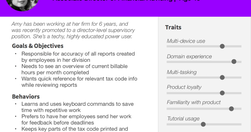
I have used both the jobs2Bdone (JTBD, #jobtodo) and persona methodologies in comms strategy development, so this is a useful distinction: "Jobs-to-be-done focus on user problems and needs, while well-executed personas... add behavioral and attitudinal details". Abandoning personas for JTBD means "missing the key behavioral considerations ... that…
"easily transforming research into visually stunning, comprehensive content. Whether you're crafting in-depth articles, detailed reports, or informative guides... Search any topic, and instantly receive a well-structured, beautifully formatted article. Publish ... and share ... with a single click."The user can customise tone, structure and visua…

"GPT-4o ... talk to users in a much more lifelike way — detecting emotions in their voices, analyzing their facial expressions and changing its own tone and cadence depending on what a user wants... It sounded more humanlike than some humans I know."And it's fast: it's “native multimodal support” means it can "take in audio prompts and analyze th…
Micro.blog ... combines blog hosting with a social media-style timeline and community" - yet another blogging platform, but interesting features and pricing for myhub:paid hosting from $5-15 / m, can use own domain, custom themes, css from short to full posts, automated photo gallery, podcast and videosbookmarking: an archive of web page bookmarks…
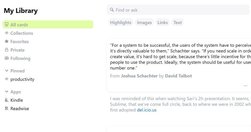
I've been kicking the tyres of Sublime, a new personal and social curation app, and pondering its approach to integrating AI.

"a deep-dive on the concrete ways Sublime makes my life better", by Sublime.app founder Sari Azout.
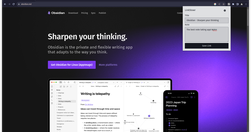
"LinkStowr is a free, open source and privacy-friendly ... store valuable online resources in a structured and meaningful way". Uses a Chrome extension to save link + note to LinkStowr, and an Obsidian plugin to sync the card to a vault. LinkStowr then deletes its unneeded copy.
You're in a meeting and the presenter asks, “Does anyone have any questions?”. Do you look around, see "no one else raising their hands, and then chose to pass on the opportunity to clear up your confusion?". Congratulations, you've just fallen for pluralistic ignorance, and it explains a lot.It is when "you feel like you’re different from everyon…
"The indiscriminate proliferation of AI-generated content will not empower the underrepresented or democratise knowledge creation... [but] dilute and fragment the authenticity and reliability of information ... the discerning judgment of human curators is the only defence against misinformation and mediocrity".Why? Human curators :"bring nuanced u…
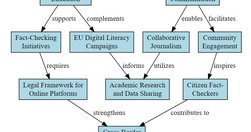
"If Charts lie, ChatGPT visualisations lie brilliantly". Exploring knowledge visualisations powered by ChatGPT, which can be particularly problematic because of the way the LLM's hallucinations - already hard to spot by their very nature - are also hidden behind the visualisation. But they have real potential as a creative muse.
"Transformation Maps... help users to explore and make sense of the complex and interlinked forces ...transforming economies, industries and global issues... insights written by experts along with machine-curated content... allows users to visualise and understand more than 250 topics and the connections and inter-dependencies between them... to s…
"text to speech and voice cloning software ... Create lifelike voiceovers for your content or use our AI voice generator as an easy-to-use text reader... spoken audio in any voice, style, and language ... renders human intonation and inflections "
"With Extensions, Bard can find and show you relevant information from the Google tools you use every day... across multiple apps and services."The personal assistant potential looks huge for users of Google services - eg "Give me a summary of my emails today".Moreover, 3rd-party extensions are on the way, starting with Adobe Firefly, Adobe’s fa…

"we used AI to make a video without writing a script or picking up a camera, but that looks as though it was filmed...:[asked] ChatGPT... Write a script in the style of a YouTube video about how to make an apple pie. The video should be under 60 seconds long. The script should feel friendly in nature...Generate your avatar video with Synthesia... …
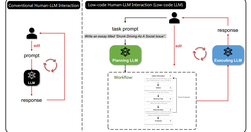
Overview of the Low-code human-LLM interaction (Low-code LLM) and its comparison with conventional interactions. The red arrow indicates the main human-model interaction loop.
"Gantt Chart, Organization, Timelines, Entity Relationship, and Mind Maps Diagram all in less than 1 minute... instruct ChatGPT to come out with the required syntax to generate your diagram ... Generate a <diagram type> in mermaid.js syntax with the following details: <details of the diagram> "
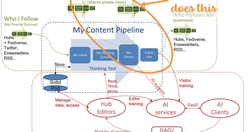
A repost of one of my experiments with the massive.wiki team, where we "developed an approach ... which simultaneously enriches blogging by adding some of the best aspects of wikis, and allows wikis to better host something resembling blogs."
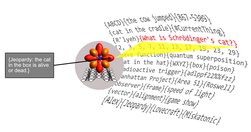
Jon Stokes thinks "people are talking about this chatbot in unhelpful ways... anthropomorphizing ... [and] not working with a practical, productive understanding of what the bot’s main parts are and how they fit together."So he wrote this explainer."At the heart of ChatGPT is a large language model (LLM) that belongs to the family of generative ma…

Wired's rules for using generative AI: "Not for images, yes for research, no for copyediting, maybe for idea generation". Meanwhile interactive book PromptCraft shows how to "get the most out of the creative man/machine communications... AI is like querying our collective intelligence".So how best to design an AI prompt? Start "by breaking down …

"the distributed/federated digital garden approach is the way to go for knowledge commoning... cribbing from ActivityPub's local, global, and 'those-you-follow' timelines... you could have local, 'those-you-follow', and global gardens... [with] some kind of liquid democracy", and interest-based groups, perhaps starting with user-defined lists: " …

Good history of design thinking."IDEO’s way of working: a six-step methodology for innovation called design thinking... Key ... was its replicable aesthetic, represented by the Post-it note:... Not too precious, not too permanent... promises a fast-moving, cooperative, egalitarian process", but is also "disruptive, startup-flavored creativity" whi…
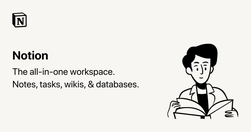
"a modern version of del.icio.us meets Roam... a searchable, interconnected repository of the most insightful content on the Internet" - and a pretty interesting example of convergent evolution vis a vis myhub.ai
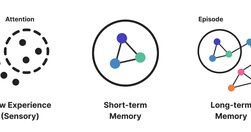
from Alice Albrecht, who "runs re:collect, a startup building an AI-powered thought partner:... advances in AI and cheaper compute lower the bar for getting from a creative idea to a final output... though, we still need to provide the initial seed... and ... judge whether we’re heading in the right direction. We’re still the creative directors o…
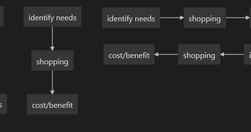
Mermaid lets you "creating diagrams using simple markup language... for quickly jotting down a sequence of steps or a set of interconnected relationships. The above diagrams are created with just a couple of lines of code. Other types include pie charts, sequences, gantt, etc.
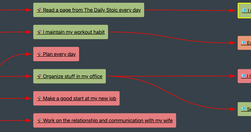
David's "journey trying to visualise relationships in my Obsidian notes" passed via various approaches, including d3, as he tried to create diagrams encapsulating relationships between nodes.He then stumbled upon the obsidian-excalidraw-plugin ... [which] automatically generate Excalidraw diagrams with its Excalidraw Automate feature... with Datav…
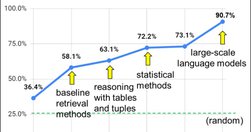
When James West "joined a small wave of users granted early access" to the new Bing (I'll call and tag it "BingGPT"), powered by the same LLM behind ChatGPT, which is "a great party trick ... powerful work tool, capable of jumpstarting creativity, automating mundane tasks", he soon "noticed strange inconsistencies... dangerously convincing falseho…
Loading more...
Relevant Overviews
- Communication Strategy
- Content Strategy
- Knowledge4Policy
- Fediverse
- Online Strategy
- Online Community Management
- Social Media Strategy
- Content Creation & Marketing
- Online Architecture
- Digital Transformation
- Personal Productivity
- Innovation Strategy
- Communications Tactics
- Psychology
- Social Web
- Media
- Politics
- Communications Strategy
- Science&Technology
- Business
- Large language models